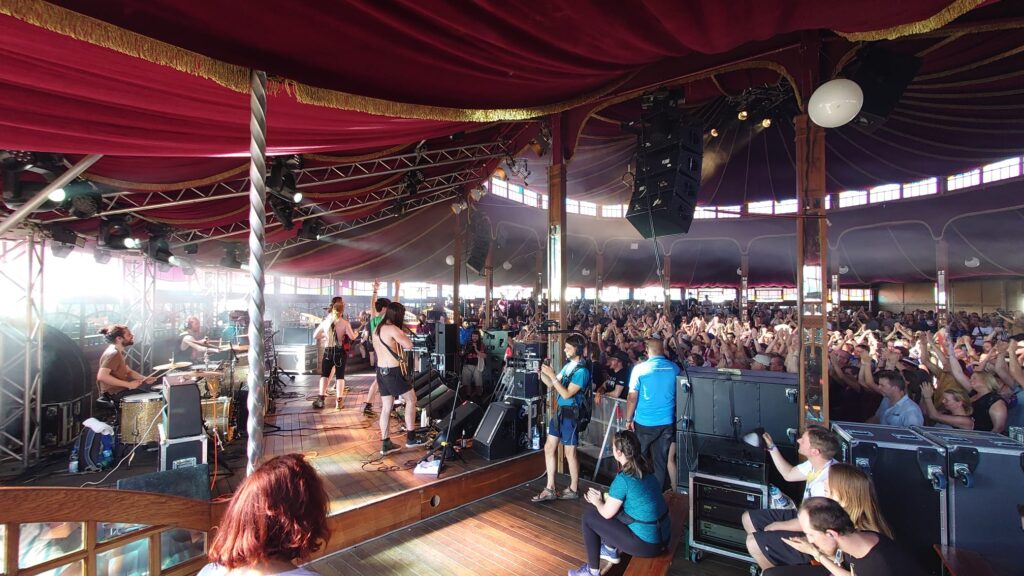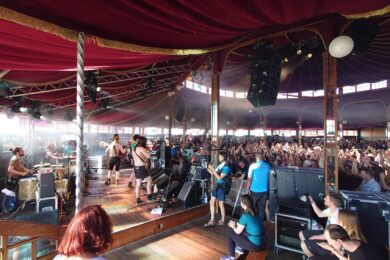“But it looks so small…” Indeed it does. Shorn of its huge main stage and the paraphernalia needed to cater to five thousand festival goers each August, the field where Haldern Pop is staged is nothing more than what it is for the rest of the year, a riding field for the Association of Saint George. An icy March wind sweeps through the open fields and bites at our knuckles as we cycle back to Haldern.
Back in this ancient Niederrheinische village, the scene of heavy fighting in March 1945, the only activity we can see, apart from the odd tractor clattering through the centre, comes from the hundreds of rooks who populate every treetop. They seem to outnumber the villagers five to one.
For a weekend in August, however, Haldern morphs into a huge, befuddled, but ultimately benign outdoor party that congas its way through the arteries of the village and festival site proper. Much has been written about the curious magic spell the three-day festival holds over people, their behaviour temporarily warped out of weft. Micro scenes spring up outside supermarkets and shops, or in the church, or in the legendary spiegelzelt, or in the towering maize fields. Curious rituals and games – enacted over decades, and often on the same spot – take place in the camping fields. Conversations become elegiac and divinatory, mostly lost in translation. People go on “Hoffmanesque” bike rides around the area, or skinny dip in the huge lake, just like Patti Smith did here once. We have witnessed gratuitous exhibitions of public nudity and tulip bulb riots, fire dances and individuals being taken home gargling and prostrate on the back of tractors. And that’s just to mention some artists who have played here.
Maybe the artists and public pick up on the fact that, despite being a festival that ostensibly caters to the permagrinning world of contemporary international pop music, Haldern Pop feels increasingly alienated, almost isolated from that world’s diktats. There is a refreshing oddness to be found in each year’s line-up. Nothing is booked to satisfy an agent, or sponsor’s whim. For every mainstream pop act on the bill or soulful gig in the church, there is an equal chance of catching a harebrained show of “ballroom dance punk-folk” from Italy’s Extraliscio, or a raving, cape-wearing, storytelling drummer like Sean Noonan. There is always plenty of darkness and menace to be found: the likes of Trupa Trupa, Chalk, Baby Volcano and Fat White Family leaven out the ethereal Cantus Domus, Loney Dear, Nils Frahm, or Sylvie Kreusch.
Haldern’s modus operandi (namely, “book people we like and hang the consequences”) has been shaped into a wider mythology, one nurtured and expressed through the worldview of festival supremo and founder, Stefan Reichmann. Reichmann’s phone calls can be as baffling and as serpentine as the tributaries of the Rhine until one tunes in to their wavelength. One legendary conversation around an upcoming edition of the festival began with an explanation, half in German, half in English, on how pollination works. This year it’s In der Küche brennt noch Licht, translated as, “a light is still on in the kitchen”. Doubtless all will be explained in time. The themes may change, but each edition is based around the idea of understanding how pop music can operate as a totally independent and informative artform.
But the festival is not the only musical story with Haldern. Certain elements in the village operate throughout the year as an easy-access resource for those seeking alternative pop culture. On the edges of the festival terrain is the Tonstudio, a rehearsal and recording studio that has hosted shows by the likes of Black Country, New Road and Douglas Dare. The centrally situated Pop Bar acts as a pub, record store and community centre; one that hosts gigs from touring bands, radio broadcasts, and readings throughout the year. It’s also the place for fabled local get togethers such as the spring meet-ups, where asparagus is consumed in large quantities. Back in the November of 2024, the bar, shrouded in the mist rolling in from the low-lying fields, hosted Bo Ningen, whose dark and pulsating incantations sandblasted a gaggle of nodding and increasingly deafened farmers and one punter who, in the face of a rail strike, had travelled for nearly four hours to make the gig. Bo Ningen in a rural candlelit bar in the middle of November? In 2023, the band played the St George Youth Centre. Acts have a loyalty to the place. Many return to record for the festival’s label.
Again, Reichmann is a driver in this glocal sense of community. Born and raised here, knows the area like the back of his hand and likes to involve its history in the festival’s wider mythology. As he often reminds me when pointing to an old blown up photograph of a woman milking a cow that hangs above the pop bar stage, “You know, the cow is from Rees.” Rees is a neighbouring town and tourist spot, considered a haughty place by Haldeners. The picture is a stout, silent token of regionalism. During lockdown, Reichmann wrote and published an illustrated book cataloguing each local bus stop, reserving a heartfelt story for each. When I visited last November, expecting to talk about that night’s Bo Ningen show, his primary concern was to show me a set of elegant chrome sculptures housed in a tractor shed in a nearby farmyard. The year 2025 sees the centenary of the local volunteer fire brigade, and the celebration plans now have his full attention. This curiosity and pride in what the area is up to feels increasingly out of place, quaint, or the subject of “curation” by those only interested in their own self-promotion. But at Haldern it is the lifeblood of the village and its festival.



